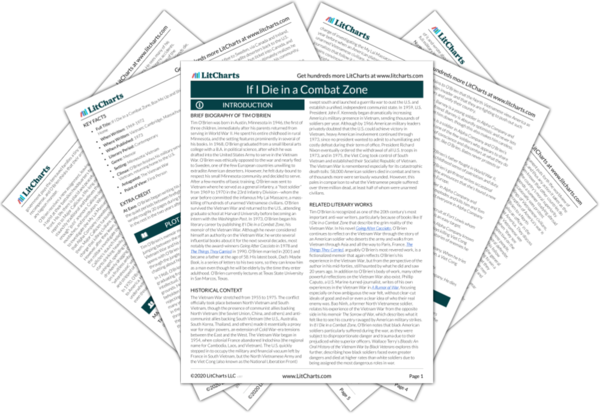Summary
Analysis
In a letter, Erik admits that he feels guilty for being in the Vietnam War yet suffering through none of the misery or combat that O’Brien experiences. He tries to find some sort of meaning to all the pain but he can’t find any. In August, another new captain takes command of Alpha Company and he marches them into a minefield within the hour, losing two more men. However, O’Brien is on leave in Chu Lai at the time, looking for a new assignment—anything to get him out of combat. After his three days of leave are up, he has not found a new position, so he rejoins Alpha Company.
Erik’s perception of the war as meaningless reiterates that the conflict is a needless pursuit which causes horrific suffering and death. Although Alpha Company’s new captain is not named—indicating that he is less important to the story than Smith or Johansen—his immediate loss of two more men suggests that he is just as inexperienced as Smith.
Themes
Escaping combat by receiving an assignment in the rear becomes every foot soldier’s singular obsession. Although many try different strategies for landing such coveted positions, O’Brien states that the only reliable way is to “burrow your nose gently up an officer’s ass.” For black soldiers, this is nearly impossible. Most officers are white and the general infantry is “disproportionately black.” Because of old prejudices, white officers tend to favor white soldiers for the best assignments. The black soldiers, in response, grow sullen, they act out, or become obstinate. The white officers then use this as evidence that the black soldiers are undisciplined and unreliable, and they continue to favor white soldiers.
O’Brien’s observations about black infantrymen and white officers suggests that racial animosity not only exists between the Americans and Vietnamese, but even within the American military itself. For black soldiers, being unable to get safer assignments in the rear echelon not only means that they have to do worse work, but that their lives are in greater danger because of their race: they are more than likely to be stuck in combat while white soldiers take the safer jobs in the rear. Thus, racial prejudice toward black soldiers creates a greater likelihood that they’ll will be killed.
Themes
The racial tensions in Alpha Company eventually reach a breaking point. The black soldiers hate their white first sergeant and resolve to do something about it. One day, as the company is hiking, something explodes beneath the white first sergeant’s feet, “disintegrate[ing]” his legs. The company calls a helicopter to take take what is left of him, but “no one felt any particular loss.” That night, a black soldier confides in O’Brien that they “took care of the first sergeant”—one of them shot a grenade launcher at his legs. Two weeks later, headquarters assigns a black first sergeant to Alpha Company.
The black soldiers’ killing of a white lieutenant suggests that, after months or years of racial prejudice and mistreatment, they view certain white officers as their enemy just as much as Viet Cong fighters. Once again, O’Brien’s depiction of who the soldiers consider to be their enemy suggests that the enemy is anyone who causes them to suffer—whether it be Vietnamese civilians, Viet Cong, or American officers.
Themes
Everyone in Alpha Company longs for a “rear job.” They aren’t cowardly, they just don’t care about winning the war. A new commander takes charge of Alpha Company, and O’Brien joins the others in hoping the commander will grant him a non-combat assignment. O’Brien reflects that soldiers in Vietnam aren’t like soldiers in World War II—there’s no talk of “valor” or heroism. They are all just trying not to die, and the only courage they summon is the courage one gathers to endure a bad day. They spend most of August on a flat hilltop, doing patrols during the day. Every night at ten o’clock, mortars strike their position for about 20 seconds. No one dies; only a few are seriously injured all month.
O’Brien’s observation that the soldiers in the Vietnam War don’t care about winning again paints the war as a fruitless campaign that even the people fighting and dying don’t care about. O’Brien’s sense that there is no valor or honor for soldiers in Vietnam suggests that this war marks a transition for America, when war ceases to be seen as a noble conquest and instead appears to be a nihilistic, evil waste of lives and resources.
Themes
Get the entire If I Die in a Combat Zone LitChart as a printable PDF.

Helicopters bring hot meals each day. Life seems good and “morale [is] high.” One day, soldiers chase two Viet Cong soldiers into a bunker and throw grenades in after them. One stumbles out to surrender, but quickly bleeds out. Alpha Company’s Vietnamese scout finds papers in the man’s pockets that identify him as a Viet Cong district chief—an important figure. The men celebrate and congratulate themselves on being “lethal” warriors, but eventually they settle down and realize it was purely luck. That night, they are mortared again. At the end of August, Alpha Company moves to another hill to supervise construction of a refugee camp. O’Brien receives notice that headquarters reassigned him to be a typist in their support base. Barney sees him off.
Alpha Company’s pride in killing a Viet Cong district chief contradicts their normal ambivalence about fighting. Even though they quickly realize it was only luck, their brief excitement and pride suggests that, despite its horrors, there is something thrilling about war and being a soldier. However, this thrill is short-lived, since they still get hit by mortar strikes, reinforcing the banality and ever-present suffering of war which overpowers any excitement. Meanwhile, O’Brien’s fortunate reassignment marks the end of his combat experience.
Themes












